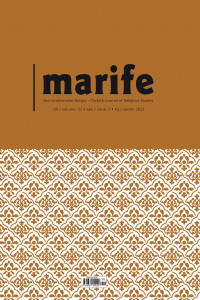Overcome the Dialectic Between Authority and Freedom: The Relationship of the Individual State in Nurettin Topçu in Terms of the Opportunity of Liberty
Öz
Nurettin Topçu, one of the remarkable names of Turkish thought in the recent period, has developed a unique system of thought with an idealistic character built with concepts such as movement, will and responsi-bility. It is clearly seen that concepts such as will and responsibility, which Topçu has emphasized enough to give color to the whole world of thought, are directly related to the construction of an idea of freedom, who developed a theoretical model guided by practical concerns, also called the philosophy of movement, inspired by his teacher Blondel. . So much so that from the point of view of Topçu, if a being called human is to be menti-oned, it is necessary to draw attention to the fact that this can only be realized by allowing the idea of freedom. However, the main issue to be discussed here will be the issue of where the society and the state stand in the emergence of man as a free being. In this context, Topçu, who does not ignore the fact that the problem of free-dom requires a multi-layered discussion, deals with the issue in an equation that includes many elements such as god, nature, society and the state. In this study, does Topçu explain the individual-state relationship with a conflict perspective, which is a common assumption in the freedom discourses of modern philosophy; Otherwi-se, it will be discussed whether this relationship reveals a competent state of freedom that emerges with a hig-her synthesis.
Anahtar Kelimeler
Turkish Islamic Thought State Freedom Individual Nurettin Topçu
Kaynakça
- Cevizci, Ahmet. “Özgürlük”, Paradigma Felsefe Sözlüğü, İstanbul: Paradigma Yayıncılık, 1999.
- Civelek, Muzaffer. Kırk Yıl Sonra Dün Gibi Nurettin Topçu. İstanbul: Dergâh Yayınları, 2017.
- Evren, Mehmet. “Locke ve Rousseau’nun Doğa Durumu ve Mülkiyet Anlayışlarının Karşılaştırılması”. Iğdır Üniversitesi İlahiyat Fakültesi Dergisi, Sayı/No: 6, (Ekim 2015), 31-44.
- Evren, Mehmet. “Jean Jacques Rousseau’da Uygarlığın Duygulara Negatif Yansımaları”, Felsefe Dünyası Dergisi, Sayı: 73, (Yaz 2021), 208-226.
- Evren, Mehmet. “Jean Jacques Rousseau’da Bilim ve Sanatın Yeri”, tabula rasa: Felsefe & Teoloji, Sayı: 35, Haziran 2020), 16-27.
- Hegel, Georg Wilhelm Friedrich. Tarihte Akıl, İstanbul: Kabalcı Yayınevi, 1995.
- Öğün, Süleyman Seyfi. Türkiye’de Cemaatçi Milliyetçilik ve Nurettin Topçu, İstanbul: Dergâh Yayınları, 1992.
- Öner, Necati. İnsan Hürriyeti. Ankara: Divan Kitap, 2013.
- Strauss, Leo. Politika Felsefesi Nedir?, çev. Solmaz Zelyüt Hünler, İstanbul: Paradigma Yayınları, 2000.
- Topçu, Nurettin. Ahlak Nizamı. İstanbul: Dergâh Yayınları, 1997.
- Topçu, Nurettin. Büyük Fetih. İstanbul: Dergâh Yayınları, 2014.
- Topçu, Nurettin. İradenin Davası – Devlet ve Demokrasi, İstanbul: Dergâh Yayınları, 1998.
- Topçu, Nurettin. İsyan Ahlâkı - Conformisme et Révolte – Türkçesi Mustafa Kök – Musa Doğan, İstanbul: Dergâh Yayınları, 2014.
- Topçu, Nurettin. Kültür ve Medeniyet, İstanbul: Dergâh Yayınları, 1998.
- Topçu, Nurettin. Yarınki Türkiye, İstanbul: Dergâh Yayınları, 1999.
- Yenişehirlioğlu, Şahin. Hegel Felsefesi’nde Birey Toplum Devlet İlişkileri, Ankara: Birey ve Toplum Yayınları, 1985.
Otorite ile Özgürlük Arasındaki Diyalektiği Aşmak: Hürriyetin İmkânı Açısından Nurettin Topçu’da Birey-Devlet İlişkisi
Öz
Yakın dönem Türk düşüncesinin dikkat çekici isimlerinden biri olan Nurettin Topçu, hareket, irade ve mesuliyet gibi kavramlar örgüsüyle inşa edilen idealist karakterde kendine özgü bir düşünce sistematiği geliş-tirmiştir. Hocası Blondel’den mülhem olmak üzere hareket felsefesi şeklinde de adlandırılan pratik kaygıların da rehberlik ettiği teorik bir model geliştirmiş olan Topçu’nun bütün bir düşünce dünyasına rengini verecek kadar üzerinde durduğu irade ve mesuliyet gibi kavramların bir hürriyet fikrinin inşasıyla doğrudan ilgili ol-duğu açıkça görülmektedir. Öyle ki Topçu açısından insan denilen bir varlıktan söz edilecekse bunun ancak hürriyet idesine imkân vererek gerçekleşebileceğine dikkat çekmek gerekmektedir. Bununla birlikte burada tartışılması gereken esas meselenin insanın hür bir varlık olarak ortaya çıkabilmesinde toplum ve devletin nerede durduğu meselesi olacaktır. Bu çerçevede hürriyet probleminin çok katmanlı bir tartışmayı gerekli kıl-dığını göz ardı etmeyen Topçu, meseleyi tanrı, tabiat, toplum ve devlet gibi pek çok unsuru içinde barındıran bir denklem içerisinde ele almaktadır. Bu çalışmada Topçu’nun birey devlet ilişkisini modern felsefenin hürriyet diskurlarında yaygın bir varsayım olan bir çatışma perspektifiyle mi açıkladığı; yoksa bu ilişkinin daha üst bir sentezle ortaya çıkan yetkin bir hürriyet durumunu mu orta çıkarttığı tartışılacaktır.
Anahtar Kelimeler
Kaynakça
- Cevizci, Ahmet. “Özgürlük”, Paradigma Felsefe Sözlüğü, İstanbul: Paradigma Yayıncılık, 1999.
- Civelek, Muzaffer. Kırk Yıl Sonra Dün Gibi Nurettin Topçu. İstanbul: Dergâh Yayınları, 2017.
- Evren, Mehmet. “Locke ve Rousseau’nun Doğa Durumu ve Mülkiyet Anlayışlarının Karşılaştırılması”. Iğdır Üniversitesi İlahiyat Fakültesi Dergisi, Sayı/No: 6, (Ekim 2015), 31-44.
- Evren, Mehmet. “Jean Jacques Rousseau’da Uygarlığın Duygulara Negatif Yansımaları”, Felsefe Dünyası Dergisi, Sayı: 73, (Yaz 2021), 208-226.
- Evren, Mehmet. “Jean Jacques Rousseau’da Bilim ve Sanatın Yeri”, tabula rasa: Felsefe & Teoloji, Sayı: 35, Haziran 2020), 16-27.
- Hegel, Georg Wilhelm Friedrich. Tarihte Akıl, İstanbul: Kabalcı Yayınevi, 1995.
- Öğün, Süleyman Seyfi. Türkiye’de Cemaatçi Milliyetçilik ve Nurettin Topçu, İstanbul: Dergâh Yayınları, 1992.
- Öner, Necati. İnsan Hürriyeti. Ankara: Divan Kitap, 2013.
- Strauss, Leo. Politika Felsefesi Nedir?, çev. Solmaz Zelyüt Hünler, İstanbul: Paradigma Yayınları, 2000.
- Topçu, Nurettin. Ahlak Nizamı. İstanbul: Dergâh Yayınları, 1997.
- Topçu, Nurettin. Büyük Fetih. İstanbul: Dergâh Yayınları, 2014.
- Topçu, Nurettin. İradenin Davası – Devlet ve Demokrasi, İstanbul: Dergâh Yayınları, 1998.
- Topçu, Nurettin. İsyan Ahlâkı - Conformisme et Révolte – Türkçesi Mustafa Kök – Musa Doğan, İstanbul: Dergâh Yayınları, 2014.
- Topçu, Nurettin. Kültür ve Medeniyet, İstanbul: Dergâh Yayınları, 1998.
- Topçu, Nurettin. Yarınki Türkiye, İstanbul: Dergâh Yayınları, 1999.
- Yenişehirlioğlu, Şahin. Hegel Felsefesi’nde Birey Toplum Devlet İlişkileri, Ankara: Birey ve Toplum Yayınları, 1985.
Ayrıntılar
| Birincil Dil | Türkçe |
|---|---|
| Konular | Felsefe |
| Bölüm | Araştırma Makalesi |
| Yazarlar | |
| Erken Görünüm Tarihi | 30 Aralık 2021 |
| Yayımlanma Tarihi | 30 Aralık 2021 |
| Kabul Tarihi | 27 Aralık 2021 |
| Yayımlandığı Sayı | Yıl 2021 Cilt: 21 Sayı: 2 |
Bu eser Creative Commons Alıntı-GayriTicari-Türetilemez 4.0 Uluslararası Lisansı ile lisanslanmıştır.

